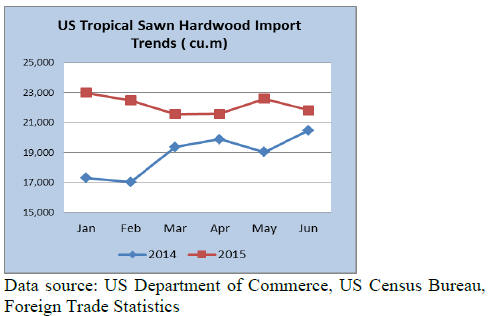|
Report from
North America
Virola sawnwood imports up in June
Total US sawn hardwood imports fell 56% from May to June, but tropical
sawnwood imports declined by only 3%. The steep decline in temperate
sawnwood imports was in imports (of unspecified species) from Bolivia.

Canada is the US¡¯ largest hardwood supplier, and its shipments grew in
June. Imports from Brazil and Germany, the second and third-largest
suppliers, fell 56% and 40%, respectively.
The US imported 21,823 cu.m. of tropical sawnwood in June, a 18%
increase in year-to-date imports from the same time last year.
Balsa imports from Ecuador grew in June, but year-to-date imports of
balsa remain below 2014 levels.
Imports from Brazil were almost unchanged from the previous month. Ipe
sawnwood imports from Brazil were slightly down from May, but virola
imports increased. Year-to-date imports from Brazi were up one third
from June 2014.
Sapelli and acajou d¡¯Afrique imports from Cameroon fell in June.
However, year-to-date total sawnwood imports from Cameroon were twice as
high as in June last year.
Malaysia showed a similar month over month decline due to lower keruing
shipments, but year-to-date imports from Malaysia remain 25% higher than
in June 2014.
By species balsa (3,971 cu.m.) and sapelli (3,825 cu.m.) were the main
imports in June, followed by ipe sawnwood (2,801 cu.m.). Mahogany
sawnwood imports were unchanged from May at 1,966 cu.m. Virola imports
more than doubled in June to 1,067 cu.m.
Higher Canadian imports from Brazil in June
The value of Canadian imports of tropical sawnwood increased by one
third month-over-month to US$2.04 million in June. Year-to-date imports
remain below 2014 levels (-30%).
The import growth in June was mainly in sapelli, red meranti and other,
unspecified species. Balsa sawnwood imports declined from May, but it
remained the most significant species (by value) imported into Canada.
US sawn hardwood imports from Brazil increased in June to US$386,425.
Imports from Congo (formerly Brazzaville) were US$291,815, up 53%
year-to-date from June 2014.
Indonesia supplied US$192,868 worth of sawnwood to Canada in June.
Year-to-date imports from Indonesia were almost unchanged from June last
year.
Tropical sawnwood imports from smaller supplier increased in June. Much
of the increase was in imports from Europe, Mexico and Thailand.
American hardwoods promotion continues in Middle East
The American Hardwood Export Council (AHEC) and the National
Hardwood Lumber Association (NHLA) will host seminars in Amman and Dubai
in September. The seminars target wood importers, manufacturers and end
users and aim to promote the understanding of American hardwood
properties, grades and potential applications.
The seminars are free, and the Jordanian Furniture Exporters Association
has partnered with AHEC for the seminar in Amman.
Demand for US hardwoods in the Middle East has continued to grow in
recent years. US exports of sawn hardwood to its four largest markets in
the region ¨C United Arab Emirate, Saudi Arabia, Jordan and Qatar ¨C was
35,084 cu.m. in 2014, up 22% from 2013. Year-to-date exports in 2015 to
the four countries were 42% higher than last year. By comparison, total
year-to-date US exports of sawn hardwood declined 10% from 2014 to 2015,
making the Middle East one of the fastest growing markets for US
hardwood exporters.
Much of the Middle East¡¯s growing demand for hardwoods is for interiors
of new buildings and in furniture manufacturing. Renovation of existing
buildings is a growing market for American hardwood products.
Large-scale transformation of temperate forests likely
Many areas of temperate forest will likely change substantially due
to climate change and a combination of disturbances and stress factors.
This is the conclusion of a study by the US Forest Service and US
Geological Survey published in the scientific journal Science (Temperate
forest health in an era of emerging megadisturbance).
Wildfires, severe droughts and warmer temperatures in particular
increase tree stress and forest mortality. Some temperate forests in the
US could convert to grassland or shrubland within the next decades.
The potential for timber production will be reduced or lost, while
important ecosystem services such as watershed protection and carbon
storage will be compromised. The study recommends further research to
identify vulnerable forests in the US and assist forest managers in
transitioning to new ecosystem states.
|